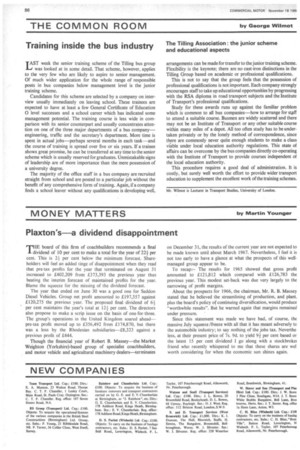THE COMMON ROOM
Page 88

If you've noticed an error in this article please click here to report it so we can fix it.
by George Wilmot
Training inside the bus industry
TAST week the senior training scheme of the Tilling bus group J-1 was looked at in some detail. That scheme, however, applies to the very few who are likely to aspire to senior management. Of much wider application for the whole range of responsible posts in bus companies below management level is the junior training scheme.
Candidates for this scheme are selected by a company on interview usually immediately on leaving school. These trainees are expected to have at least a few General Certificate of Education 0 level successes and a school career which has indicated some management potential. The training course is less wide in comparison with its senior counterpart and usually concentrates attention on one of the three major departments of a bus company— engineering, traffic and the secretary's department. More time is spent in actual jobs—perhaps several months in each task—and the course of training is spread over five or six years. If a trainee shows great promise, he can be transferred at any time to the senior scheme which is usually reserved for graduates. Unmistakable signs of leadership are of more importance than the mere possession of a university degree.
The majority of the office staff in a bus company are recruited straight from school and are posted to a particular job without the benefit of any comprehensive form of training. Again, if a company finds a school leaver without any qualifications is developing well, arrangements can be made for transfer to the junior training scheme. Flexibility is the keynote; there are no cast-iron distinctions in the Tilling Group based on academic or professional qualifications.
This is not to say that the group feels that the possession of professional qualifications is not important. Each company strongly encourages staff to take up educational opportunities by progressing with the RSA diploma in road transport subjects and the Institute of Transport's professional qualifications.
Study for these awards runs up against the familiar problem which is common to all bus companies—how to arrange for staff to attend a suitable course. Busmen are widely scattered and there may not be an Institute of Transport or any other suitable course within many miles of a depot. All too often study has to be undertaken privately or by the lonely method of correspondence, since there are commonly never quite enough students to make a class viable under local education authority regulations. This state of affairs can be overcome by the bus companies directly co-operating with the Institute of Transport to provide courses independent of the local education authority.
This procedure requires a good deal of administration. It is costly, but surely well worth the effort to provide wider transport education to supplement the excellent work of the training schemes.
Mr. Wilmot is Lecturer in Transport Studies, University of London.




































































































































